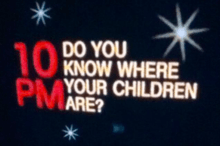Do you know where your children are?
"Do you know where your children are?" is a question used as a public service announcement (PSA) for parents on American television especially from the late 1960s through the late 1980s. Accompanied by a time announcement, this phrase is typically used as a direct introduction for the originating station's late-evening newscast, typically at either 10:00 p.m. or 11:00 p.m.[1] While the phrase itself had appeared in newspapers as early as the 19th century, usage of it in broadcasting started in the early 1960s following the enactment of nightly youth curfews for minors in multiple large cities.[2]

When proposing a nightly youth curfew in the state in early 1961, Massachusetts state senator William X. Wall notably urged all radio and television broadcasters to ask the question on-air, so as to remind parents to check up on their children.[3] The first high-profile usage of the phrase was by KHJ-TV (channel 9) in Los Angeles in 1964, which had the question read on-air by booth announcers during the nightly 10:00 p.m. station break.[4] Following the adoption of a 10:30 p.m. curfew in Baltimore, WJZ-TV (channel 13) began running the announcement at 11:00 p.m. in consultation with the city's mayor Thomas D'Alesandro III;[5][note 1] this followed a series of documentaries produced by the station regarding issues facing younger generations, and was inspired by positive reception of the PSA on Milwaukee television.[6] WJZ-TV's owner Westinghouse Broadcasting quickly adopted this phrase for other stations owned by the chain, including KYW-TV in Philadelphia and WBZ-TV in Boston.[7][8]
WNEW-TV (channel 5) in New York City, along with WKBW-TV in Buffalo, New York, are two of the more notable stations to have utilized this announcement. WNEW-TV began usage of the phrase in 1967 by Mel Epstein, WNEW-TV's director of on-air promotions, response to the rising level of crime in the city;[2] it is still used by the station—known as WNYW since 1986—on a nightly basis.
The PSA was featured on Time magazine's "Top 10 Public-Service Announcements" list.[1]
The PSA was often parodied.[1] The line appeared in The Simpsons episode "Bart After Dark", upon which Homer Simpson responded to the television, "I told you last night — no!,"[1] and as the tagline for the 1999 movie 200 Cigarettes.
On Michael Jackson's compilation album Xscape, which was posthumously released in 2014, there is a track titled "Do You Know Where Your Children Are", banking on the PSA rhetoric; albeit the title's controversial reception, Jackson narrates the events of an underage girl who undergoes child sexual abuse and neglect in this song.[9]
References
- "Top 10 Public-Service Announcements - What Time Is It?". Time. Retrieved 3 April 2016.
First launched by a small ABC affiliate in upstate New York...
- Kovalchik, Kara. "The Origin of "It's 10 PM. Do You Know Where Your Children Are?"". Mental Floss. Retrieved 3 April 2016.
- "Curfew Reminder Urged For Parents". Newport Daily News. Associated Press. February 1, 1961. p. 9. Retrieved June 14, 2020 – via Newspapers.com.
- Weinstock, Matt (November 1, 1964). "Politics, Stay 'Way From My Door". Los Angeles Times. Times Mirror Company. p. F7. Retrieved June 14, 2020 – via Newspapers.com.
- Goodspeed, John (January 13, 1967). "Mr. Peep's Diary". The Baltimore Sun. J. Reginald Murphy. p. B1. Retrieved June 15, 2020 – via Newspapers.com.
- Kirkley, Donald (January 2, 1967). "Look and Listen with Donald Kirkley". The Baltimore Sun. J. Reginald Murphy. p. B5. Retrieved June 14, 2020 – via Newspapers.com.
- "WFIL Will Telecast Cardinal Krol Rites". The Philadelphia Inquirer. Walter Annenberg. June 23, 1967. p. 22. Retrieved June 15, 2020 – via Newspapers.com.
- "Ask the Globe". The Boston Globe. June 23, 1967. p. 2. Retrieved June 15, 2020 – via Newspapers.com.
- "Michael Jackson – "Do You Know Where Your Children Are?"". Stereogum. 2014-05-09. Retrieved 2020-02-11.
Notes
- Thomas D'Alesandro III had proposed the curfew while still serving in Baltimore City Council; he became the mayor of Baltimore concurrent with WJZ-TV adopting the phrase.
External links
- Public Service Announcement - It's 10PM Do You Know Where Your Children Are?
- Do You Know Where Your Children Are?- PSA from 1979 - with Grace Jones
- Do You Know Where Your Children Are?- PSA from 1984 - with Andy Warhol
- FOX/WNYW's Earl Monroe PSA from 1986
- It's 11PM Do You Know Where Your Children Are?-WKBW version, circa 1988. - voiced by Tom Jolls
- It's 11:00 Do You Know Where Your Children Are - featured on The Simpsons
- Michael Jackson - Do You Know Where Your Children Are from Xscape (album)